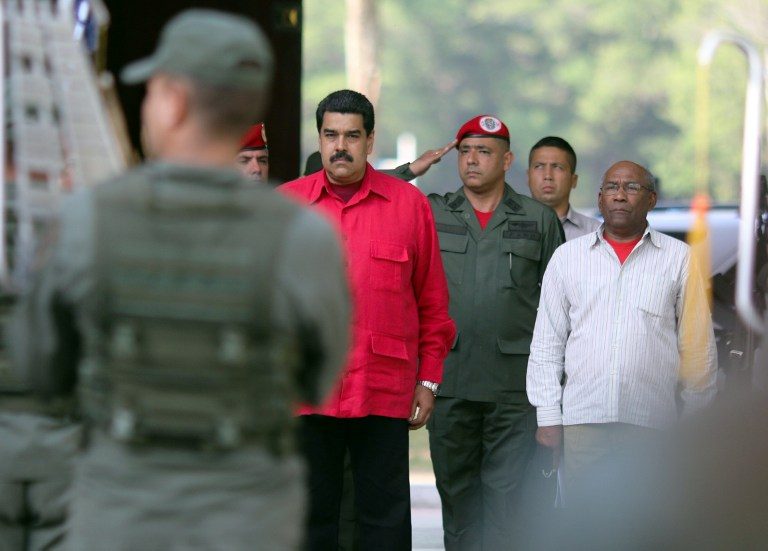SUMMARY
This is AI generated summarization, which may have errors. For context, always refer to the full article.

CARACAS, Venezuela – Venezuela’s armed forces, which are conducting exercises against perceived internal and external threats, hold immense power in the government of President Nicolas Maduro and notably have interests in the vital oil sector.
The military boasts Russian and Chinese systems, including Sukhoi strike jet fighters, missiles and tanks.
Political power
Of the government’s 30 ministries, 10 are held by active or retired military men.
They include the ministries for food, for agricultural production and land, and for fishing and aquaculture – key portfolios during Venezuela’s current food crisis.
The opposition-controlled Congress last month ordered that Food Minister Rodolfo Marco Torres be fired for the severe lack of basic food stocks.
But the Supreme Court, stacked with judges loyal to Maduro, voided that measure.
Venezuela’s critical electricity shortage is being handled by the energy ministry in the hands of General Luis Motta Dominguez, who implemented rationing.
The minister for housing, habitats and ecosocialism is General Manuel Quevedo, tasked with battling the opposition over the issue of free social housing. While the government has started giving deeds to occupants, it is with the condition that the property cannot be sold.
Economic power
The military owns businesses including a television network, a bank, a vehicle assembly enterprise and a construction company.
In February, it created a new oil, mining and gas industrial group called CAMIMPEG.
The entity handles some activities already managed by the state-owned PDVSA oil company such as terms maintaining oil wells, and selling and distributing mining, petrochemical, oil and gas products.
Maduro said CAMIMPEG was part of an array of companies set up to challenge private interests in Venezuela that he accuses of waging an “economic war.”
Armed power
Venezuela’s National Bolivarian Armed Forces commands 165,000 active-duty personnel, 25,000 reservists and several thousand in civilian militias.
The United States in 2006 banned the sale or transfer of American military weapons and technology to Venezuela, driving the president at the time, Hugo Chavez, into the arms of Russia and China.
Control Ciudadano, a non-governmental body monitoring military activity, said it has been unable to establish how much, and precisely what sort of weapon systems Venezuela acquired between 2005 and 2012 because of laws making that information secret.
It said Russia has supplied rifles, anti-tank rockets, armored vehicles, tanks, infantry combat vehicles, anti-aircraft defense systems, fighter planes, helicopters and missiles.
A factory to make AK-103 and AK-104 assault rifles and another to make munitions are due to open next year.
China, meanwhile, has provided Venezuela with military communications, uniforms, anti-riot gear, radars, armored vehicles, aircraft and helicopters. – Rappler.com
Add a comment
How does this make you feel?
There are no comments yet. Add your comment to start the conversation.